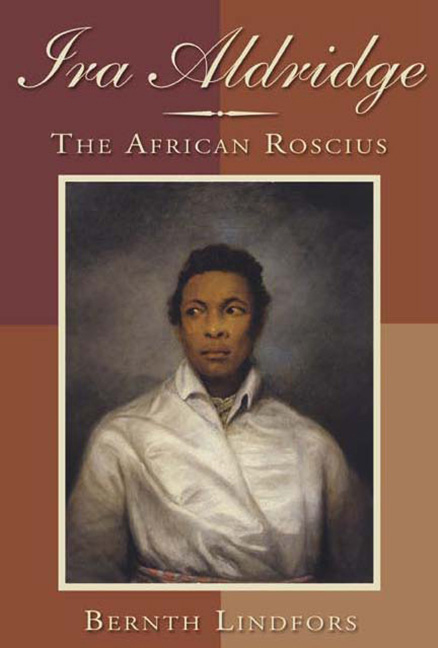Book contents
- Frontmatter
- Miscellaneous Frontmatter
- Contents
- List of Illustrations
- Acknowledgments
- Introduction
- Part One: The Life
- Part Two: The Career
- 8 Ira Aldridge's Fight for Equality
- 9 Ira Aldridge in Manchester
- 10 Acting Black: Othello, Othello Burlesques, and the Performance of Blackness
- 11 Ira Aldridge: Shakespeare and Minstrelsy
- 12 “Mislike me not for my complexion … “: Ira Aldridge in Whiteface
- 13 Ira Aldridge as Macbeth and King Lear
- 14 Creating the Black Hero: Ira Aldridge's The Black Doctor
- 15 The First American on the Zagreb Stage
- 16 A Heartwarming, Radiant Othello in the Netherlands, 1855
- 17 Ira Aldridge's Performances in Meiningen
- 18 “Othello's Occupation's Gone!” The African Roscius in Poland, 1853–67
- Notes on Contributors
- Index
- Miscellaneous Endmatter
14 - Creating the Black Hero: Ira Aldridge's The Black Doctor
from Part Two: The Career
Published online by Cambridge University Press: 26 October 2017
- Frontmatter
- Miscellaneous Frontmatter
- Contents
- List of Illustrations
- Acknowledgments
- Introduction
- Part One: The Life
- Part Two: The Career
- 8 Ira Aldridge's Fight for Equality
- 9 Ira Aldridge in Manchester
- 10 Acting Black: Othello, Othello Burlesques, and the Performance of Blackness
- 11 Ira Aldridge: Shakespeare and Minstrelsy
- 12 “Mislike me not for my complexion … “: Ira Aldridge in Whiteface
- 13 Ira Aldridge as Macbeth and King Lear
- 14 Creating the Black Hero: Ira Aldridge's The Black Doctor
- 15 The First American on the Zagreb Stage
- 16 A Heartwarming, Radiant Othello in the Netherlands, 1855
- 17 Ira Aldridge's Performances in Meiningen
- 18 “Othello's Occupation's Gone!” The African Roscius in Poland, 1853–67
- Notes on Contributors
- Index
- Miscellaneous Endmatter
Summary
One of Ira Aldridge's short-term theatrical successes in the late 1840s was The Black Doctor, a melodrama originally written as Le Docteur Noir by Auguste Anicét- Bourgeois and Philippe François Pinel Dumanoir and first acted at the Porte-Saint-Martin Theater in Paris on July 30, 1846. Translated into English by John Vilon Bridgeman, it opened in London at the Royal Victoria Theatre on November 13, 1846, having been adapted for the British stage by Thomas Hailes Lacy, who subsequently published his adaptation. Another version, adapted by Thomas Archer, had been staged at the City of London Theatre a few days earlier, on November 9, 1846. The play, in one or both of these forms, and in at least one other theater (St. James), ran successfully in London for upwards of eighty nights. Aldridge started performing the Archer version in Bath (see figure 14.1), Bristol, and Dublin in February–March 1847, but according to a competing publisher, John Dicks, he made further alterations to the text. When The Black Doctor appeared as no. 460 in Dicks’ Standard Plays years later, Dicks stated that it had been “adapted to the English stage, by Ira Aldridge.” While much of the Aldridge version reads as a paraphrase of the Lacy text, there are significant differences, which I want to argue reveal a work that gives particular emphasis to race and class issues in creating a Romantic hero and that ultimately, I believe, comments on Aldridge's treatment by the London theatrical establishment.
The plot can be easily summarized, despite the complications, as is often the case with melodrama. Fabian, once a slave on the Isle of Bourbon, gained his freedom by saving the lives of the master's family, through both his courage and his medical skills. One of those he saved was the Marquis de la Reynerie's daughter Pauline; when her mother, now a widow, apparently perishes at sea, Fabian once again comes to her aid. He falls in love with her, but knowing the rules of his society, he isolates himself rather than admit his feelings to anyone. When Pauline comes to his cabin to thank him and to seek his help for another of her servants, he arranges to meet her at an isolated cove.
- Type
- Chapter
- Information
- Ira AldridgeThe African Roscius, pp. 204 - 215Publisher: Boydell & BrewerPrint publication year: 2007

